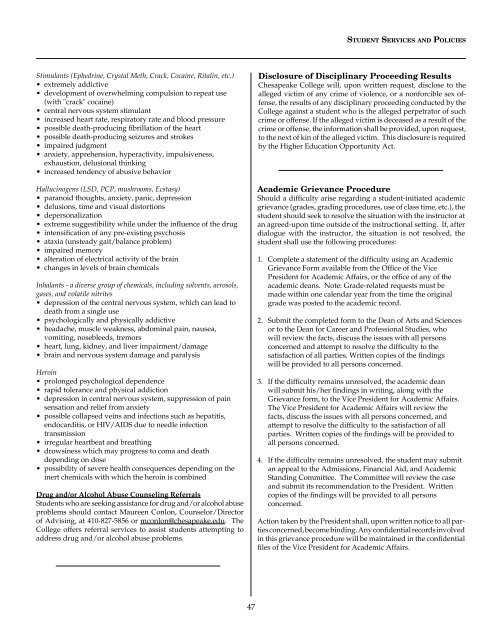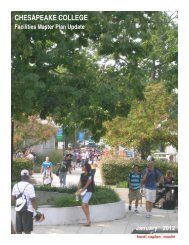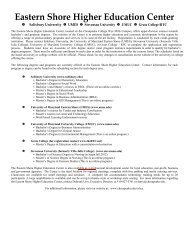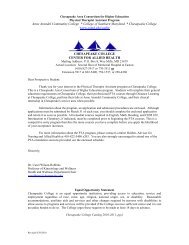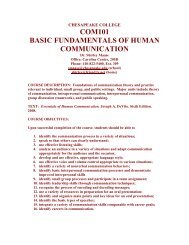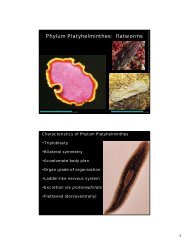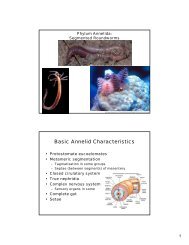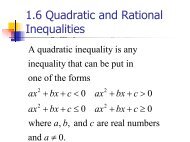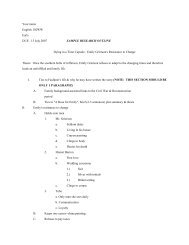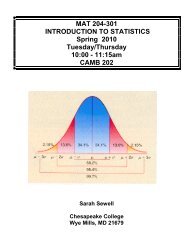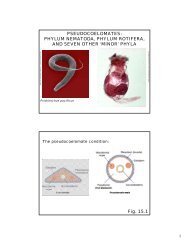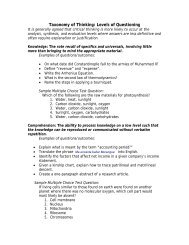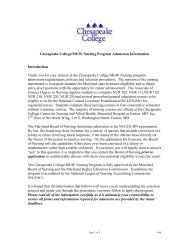Academic Calendar 2011-2012 - Chesapeake College
Academic Calendar 2011-2012 - Chesapeake College
Academic Calendar 2011-2012 - Chesapeake College
Create successful ePaper yourself
Turn your PDF publications into a flip-book with our unique Google optimized e-Paper software.
Student Services and PoliciesStimulants (Ephedrine, Crystal Meth, Crack, Cocaine, Ritalin, etc.)• extremely addictive• development of overwhelming compulsion to repeat use(with "crack" cocaine)• central nervous system stimulant• increased heart rate, respiratory rate and blood pressure• possible death-producing fibrillation of the heart• possible death-producing seizures and strokes• impaired judgment• anxiety, apprehension, hyperactivity, impulsiveness,exhaustion, delusional thinking• increased tendency of abusive behaviorHallucinogens (LSD, PCP, mushrooms, Ecstasy)• paranoid thoughts, anxiety, panic, depression• delusions, time and visual distortions• depersonalization• extreme suggestibility while under the influence of the drug• intensification of any pre-existing psychosis• ataxia (unsteady gait/balance problem)• impaired memory• alteration of electrical activity of the brain• changes in levels of brain chemicalsInhalants - a diverse group of chemicals, including solvents, aerosols,gases, and volatile nitrites• depression of the central nervous system, which can lead todeath from a single use• psychologically and physically addictive• headache, muscle weakness, abdominal pain, nausea,vomiting, nosebleeds, tremors• heart, lung, kidney, and liver impairment/damage• brain and nervous system damage and paralysisHeroin• prolonged psychological dependence• rapid tolerance and physical addiction• depression in central nervous system, suppression of painsensation and relief from anxiety• possible collapsed veins and infections such as hepatitis,endocarditis, or HIV/AIDS due to needle infectiontransmission• irregular heartbeat and breathing• drowsiness which may progress to coma and deathdepending on dose• possibility of severe health consequences depending on theinert chemicals with which the heroin is combinedDrug and/or Alcohol Abuse Counseling ReferralsStudents who are seeking assistance for drug and/or alcohol abuseproblems should contact Maureen Conlon, Counselor/Directorof Advising, at 410-827-5856 or mconlon@chesapeake.edu. The<strong>College</strong> offers referral services to assist students attempting toaddress drug and/or alcohol abuse problems.Disclosure of Disciplinary Proceeding Results<strong>Chesapeake</strong> <strong>College</strong> will, upon written request, disclose to thealleged victim of any crime of violence, or a nonforcible sex offense,the results of any disciplinary proceeding conducted by the<strong>College</strong> against a student who is the alleged perpetrator of suchcrime or offense. If the alleged victim is deceased as a result of thecrime or offense, the information shall be provided, upon request,to the next of kin of the alleged victim. This disclosure is requiredby the Higher Education Opportunity Act.<strong>Academic</strong> Grievance ProcedureShould a difficulty arise regarding a student-initiated academicgrievance (grades, grading procedures, use of class time, etc.), thestudent should seek to resolve the situation with the instructor atan agreed-upon time outside of the instructional setting. If, afterdialogue with the instructor, the situation is not resolved, thestudent shall use the following procedures:1. Complete a statement of the difficulty using an <strong>Academic</strong>Grievance Form available from the Office of the VicePresident for <strong>Academic</strong> Affairs, or the office of any of theacademic deans. Note: Grade-related requests must bemade within one calendar year from the time the originalgrade was posted to the academic record.2. Submit the completed form to the Dean of Arts and Sciencesor to the Dean for Career and Professional Studies, whowill review the facts, discuss the issues with all personsconcerned and attempt to resolve the difficulty to thesatisfaction of all parties. Written copies of the findingswill be provided to all persons concerned.3. If the difficulty remains unresolved, the academic deanwill submit his/her findings in writing, along with theGrievance form, to the Vice President for <strong>Academic</strong> Affairs.The Vice President for <strong>Academic</strong> Affairs will review thefacts, discuss the issues with all persons concerned, andattempt to resolve the difficulty to the satisfaction of allparties. Written copies of the findings will be provided toall persons concerned.4. If the difficulty remains unresolved, the student may submitan appeal to the Admissions, Financial Aid, and <strong>Academic</strong>Standing Committee. The Committee will review the caseand submit its recommendation to the President. Writtencopies of the findings will be provided to all personsconcerned.Action taken by the President shall, upon written notice to all partiesconcerned, become binding. Any confidential records involvedin this grievance procedure will be maintained in the confidentialfiles of the Vice President for <strong>Academic</strong> Affairs.47


